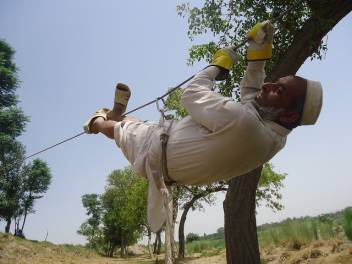 The International Day for Disaster Reduction (13 October) is to remind us about the disasters that keep affecting the lives of so many people around the world and how much loss of life and assets could be prevented by risk reduction measures.
The International Day for Disaster Reduction (13 October) is to remind us about the disasters that keep affecting the lives of so many people around the world and how much loss of life and assets could be prevented by risk reduction measures.
This year the focus of the IDDR is on some 1 billion people around the world who live with some form of disability.
Disabled people have specific needs but also have strengths which are often overlooked in disasters and disaster risk reduction.
HelpAge has vast experience working with this group as a percentage of older people are physically or mentally impaired.
I just returned from a visit to HelpAge office in Pakistan where we are providing technical advice to several other international NGOs and government disaster management authorities on the inclusion of vulnerable groups such as older people and people living with disabilities in Disaster Risk Reduction.
We have been developing guidelines on this and are also in the process of developing a training module. In discussions with other NGOs and government authorities I noticed they constantly refer to older people and people with disabilities as requiring special assistance.
This is a fact for the physically and mentally impaired individuals but I kept reminding them that this is just one side of the story. Any individual or vulnerable group has their own strengths too!
Inspiring indigenous knowledge
HelpAge has been working with older people across Pakistan and time and time again we are inspired by the traditional and indigenous knowledge older people can bring into a disaster risk reduction initiative.
Floods are a frequently experienced disaster in some parts of Pakistan. Younger generations are thinking in terms of lifejackets to safe lives in times of floods but these are expensive and not readily available in rural Pakistan.
Older people have demonstrated there is a cheaper and readily available solution whereby empty plastic bottles are tied together around ones waist. Older people have also been training the younger generation on how to make ladders and floating rafts of locally available materials.
To ensure older people’s needs and capacities are taken into consideration during Disaster Risk Reduction activities, Older People’s Associations are appointing representatives to become a member of the community’s First Aid and Search & Rescue committees.
We see young and old working together whereby the older people share their traditional and indigenous knowledge and experiences and the young and old decide jointly on accepted methods to predict floods (older people are sometimes able to read from the livestock (mating) habits whether there are changes in the air) and how to disseminate early warning alerts to the community.
The communities are doing mock drills to get prepared for emergency situations. It is encouraging to see how young and old are cooperating and helping each other. The Search & Rescue committee would see older people giving instructions on how to tie a rope to allow community members to cross a flooded area safely whereby the young would build a construction to transport physically impaired older people and others across the same area.
Witnessing the capacities of older people in Pakistan has strengthened my belief that with appropriate support and empowerment, the ability of older people and their families to cope and respond to disasters and climate change will increase – bringing innovative solutions and benefits to the communities at large!
